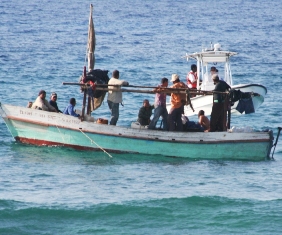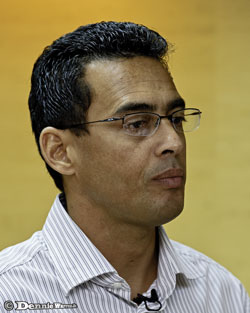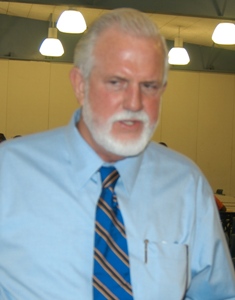Archive for April 8th, 2011
Debate on new seats delayed
(CNS): The people of the Cayman Islands will not be getting single member constituencies at the next election, despite that being the preference of the majority. Government has now confirmed that it does not plan to change the current six electoral districts but will be adding one seat to Bodden Town and two to George Town, giving electors in the capital a whopping six votes. Although the draft order was placed upon the table of the Legislative Assembly on Friday morning, the debate was halted before it even started when one member pointed out that the language of the schedule gave the impression that government was, in fact, introducing single member constituencies on Grand Cayman.
The government was forced to suspend the debate until Monday in order to re-write the schedule, which spoke about 17 constituencies and did not clarify that this referred to polling station areas as oppose to actual electoral seats.
The draft order, which comes nine months after the Electoral Boundary Commissions report was published, was laid on the table prior to the premier presenting a government motionon the subject that would have triggered what is expected to be a heated debate. However, Ezzard Miller, the member for North Side who is a staunch advocate of introducing single member constituencies across the islands, pointed out that the document, if passed in the form it was presented, would do just that.
The error sent the legislators into backroom discussions but not before the premier and the opposition leader had engaged in a heated exchange over the process and government's failure to supply the opposition benches with the details of the motion. As McKeeva Bush announced his government's intention to table the draft and to follow it with a motion for debate, Alden McLaughlin pointed out that nine months after the report had been given to the LA, on the morning that government wanted to debate the proposals on what was a matter of critical importance the opposition had still not been given a copy of that motion.
Bush, however, noted that government did not intend to make any changes to the existing electoral boundaries in order to meet the constitutional requirement to increase the country's parliament by three members before the next election, which is expected to take place in 2013.
As a result, the political landscape will remain the same but Bodden Town, the fastest growing district, and the capital will get the extra seats. This was one of the possible scenarios reflected in the Boundary Commission's report. However, the commissioners had indicated that combining the neighbourhoods of Prospect and Savannah to create a seventh electoral district would be preferable to prevent the obvious political imbalance that the addition of seats to George Town would create.
The commissioners also outlined the alternative of one man one vote over sixteen single member constituencies on Grand Cayman, with Cayman Brac retaining its multi-member-two-man constituency. Although the commissioners did not directly recommend this option, it noted that during its public consultation period, at every meeting it held the people of Grand Cayman and made it clear that they wanted one man, one vote.
People asked to speak-up on FOI law
(CNS): Although no discussion document has been presented, the sub-committee of the Freedom of Information Committee of the Legislative Assembly is looking for public feedback regarding the review of the Freedom of Information law. The review was mandated by the law itself to ensure that it is working properly and providing access to the information government holds. The select committee has so far only held closed door discussions, and based on comments by the premier there have been concerns in the community that the current administration may seek to remove the right to anonymous requests or introduce fees.
In the past the premier has criticized the FOI law for the cost and for the distraction he says it causes to staff who are forced to respond to requests from anonymous applicants or Mickey Mouse.
In 2010 McKeeva Bush took aim particularly at Nicky Watson, the owner of Cayman News Service, for what he said was wasting government time because of an FOI request she submitted asking for details of his travel arrangements since taking office.
Bush asked what good such a request was and criticized the law for allowing notonly anonymous requests, but requests without reason. Bush said Mickey Mouse could make a request and government had to waste its time answering Mickey Mouse without knowing who and what the information was for. “Instead of doing government business, civil servants are writing back to Mickey Mouse,” he said.
The public now has a chance to offer its opinion on what changes, if any, are needed to the law to the sub-committee. The establishment of the committee itself had also sparked controversy last year when The Caymanian Compass published an article and an editorial pointing to the irony that law makers were discussing the freedom of information behind closed doors. As a result the Speaker called for an apology before suspending Brent Fuller for the remainder of the week for what she said was the journalist’s privilege to report .
Shortly afterwards, the independent member for North Side took the issue a step further and tabled a motion asking the attorney general to prosecute both the paper and the reporter, Brent Fuller. Ezzard Miller had suggested the offence committed by the paper was the use of the word “secret” to describe closed door meetings of a select committee, implying that lawmakers may do something “untoward during those deliberations”.
Legislators have still not explained why the sub-committee review of the FOI has opted for closed door hearings when it is at the members’ discretion to hold the meetings in public if they so choose. Although select committee meetings are usually ’in camera’ unless witnessed are being called, how meetings are conducted is still a matter for the chair and the committee.
Although it has not yet been revealed whether law makers are seeking to limit FOI access or improve it, the people at least now have a window of opportunity to express their thoughts about the law. The FOI legislation has been one of the most groundbreaking pieces of legislation in terms of transparency in government. It has provided the public with the first ever legal means of uncovering the formally secret workings of government.
From the cost of the premier’s travel to public servants’ perks and benefits, information previously kept well under wraps has begun to come to light and the law has seen government departments begin to be proactive about transparency and publish things such as minutes of statutory board meetings and internal reports on websites .
With the government’s financial reports so many years behind, the FOI Law is one of the few ways that the public can hold their elected representatives and the wider public service to account.
Comments can be forwarded to the attention of the Clerk of the Legislative Assembly. Input can be sent electronically to foi.lgl@gov.ky or dropped off at the Legislative Assembly Building, Fort Street, George Town. Deadline for submission of comments is 8 May 2011.

Cubans opt to sail on to Honduras in 24ft boat
 (CNS): Another vessel carrying migrants from Cuba came into Cayman waters this week, officials revealed on Thursday. After a long absence, this is now the third vessel that has been spotted in the Cayman area carrying migrants from the neighbouring island this year. Immigration reported that the 24-foot vessel carrying 15 Cuban adult males was intercepted on Wednesday morning off the south coast of Cayman Brac. Officials said the boat and its passengers were inspected by local authorities but the migrants indicated their intention to travel to Honduras and departed around 5pm the same day.
(CNS): Another vessel carrying migrants from Cuba came into Cayman waters this week, officials revealed on Thursday. After a long absence, this is now the third vessel that has been spotted in the Cayman area carrying migrants from the neighbouring island this year. Immigration reported that the 24-foot vessel carrying 15 Cuban adult males was intercepted on Wednesday morning off the south coast of Cayman Brac. Officials said the boat and its passengers were inspected by local authorities but the migrants indicated their intention to travel to Honduras and departed around 5pm the same day.
Immigration said the boat and its passengers were monitored by Cayman Brac officials until their vessel passed Little Cayman. Under the controversial memorandum of understanding Cayman has with the Cuban government, if the refuges ask for any assistance from water to medical supplies they can only receive the assistance if they come ashore and agree to be deported back to Cuba.

CUC boss says power is back
 (CNS): Grand Cayman’s power boss says that the firm is back up to sufficient generating capacity to serve the current peak demand, so he does not anticipate any more rolling blackouts. Richard Hew, the CEO of Caribbean Utilities Company Ltd, explained on Thursday that the mechanical failure of two units over the weekend, when a third was on planned maintenance on a hot day, caused the power company’s difficulties meeting demand. This led to rolling blackouts across the islands on Sunday and Monday. With three major units still off line as a result of previous failures and explosions, Hew said the weekend’s problems meant the company was running only 13 generators from its total of 20 units.(Photo Dennie WarrenJr)
(CNS): Grand Cayman’s power boss says that the firm is back up to sufficient generating capacity to serve the current peak demand, so he does not anticipate any more rolling blackouts. Richard Hew, the CEO of Caribbean Utilities Company Ltd, explained on Thursday that the mechanical failure of two units over the weekend, when a third was on planned maintenance on a hot day, caused the power company’s difficulties meeting demand. This led to rolling blackouts across the islands on Sunday and Monday. With three major units still off line as a result of previous failures and explosions, Hew said the weekend’s problems meant the company was running only 13 generators from its total of 20 units.(Photo Dennie WarrenJr)
However, with the cushion back up, Hew said the firm should not need to shed load unless there were more unexpected major mechanical failures. “If there are no other unplanned events the rotating outages are behind us for now,” he reassured the community.
One of units that broke at the weekend is now back in action and engineers have found the problem with the second, Hew stated. The company is now back up to 109 megawatts to serve a 98 megawatt peak demand and by next week will have 118 megawatts.
Although CUC owns a generating capacity of over 151 megawatts across 20 units to serve an absolute top demand of 102 megawatts, the combination of three major failures as well as regular maintenance and day to day mechanical problems combined to leave CUC short of working units. Hew said this had nothing to do with changes to the license agreement between the power firm and government, adding that CUC was not taking short cuts and the goal was still to have the ability to generate 135-155% of Grand Cayman’s peak demand.
He said that the recent situation was not typical of CUC’s service to its customers. Hew added that customers have enjoyed a high service in the past and were understandably concerned. The power boss explained that In 2010 the company had a 99.6% coverage level, which translated to each customer having only three and a half hours of lost power over an entire year. Given this weekend’s losses, where most customers were without power for at least two hours, he said that CUC would be unlikely to match that previous high level of service.
He said the intention was still to keep any power cuts down to less than an hour at a time, and with a new temporary generator and other units repaired, he was confident that the situation at the weekend was behind CUC.
Despite his confidence, unexpected events could, until the major units are back in service in May, cause further outages and he said CUC recognised the need to try and give customers notice when possible. He said the firm was investigating various channels to push the information out.
He explained that load shedding is selected by trying to match demand and capacity and the issue of commercial areas versus residential ones depending on time of day. “If it is in evening we will cut commercial areas and avoided the residential, but the difficulty is that commerce is spread around. It’s never a good situation when you have to have the lights out so we have to do our best to minimise the impact.”
He said the selection was usually a management decision and only automated when a unit instantaneously trips off and the computer would then cut according to capacity.
With repairs on major units expected to be complete by May as well as on-going maintenance and the introduction of a new temporary 15 megawatt generator, CUC will have more capacity this summer than last, Hew said. More importantly, it would have a bigger cushion between the firm’s ability to generate power and the demand for that power from customers. He further stated that the costs of dealing with mechanical problems and generator failures would not find their way on to customers’ bills.

Young offenders facility to be built in George Town
 (CNS): A site adjacent to Fairbanks Women’s Prison will be the home of the proposed Cayman Islands youth offenders facility, with construction expected to begin by the end of the summer. The site, across from the Triple C School, is currently home to the last remaining trailers in George Town, housing people displaced by Hurricane Ivan. However, government is refurbishing the Lyndhurst Apartments, where it says the trailer residents will be moved to make way for the new style juvenile prison. Although mandated in the new constitution, the minister responsible said there was a pressing need for the unit.
(CNS): A site adjacent to Fairbanks Women’s Prison will be the home of the proposed Cayman Islands youth offenders facility, with construction expected to begin by the end of the summer. The site, across from the Triple C School, is currently home to the last remaining trailers in George Town, housing people displaced by Hurricane Ivan. However, government is refurbishing the Lyndhurst Apartments, where it says the trailer residents will be moved to make way for the new style juvenile prison. Although mandated in the new constitution, the minister responsible said there was a pressing need for the unit.
Community Affairs Minister Mike Adam announced the plans at a public meeting earlier this week attended by only about 30 people, some of whom were government representatives, at the Family Life Center.
Though disappointed with the low turnout, Adam noted that his ministry had recently hand-delivered pamphlets on the facility to residents of the Fairbanks Road area and they could still offer feedback on the project.
Adam pointed out there was a pressing need for the youth facility, explaining that Cayman’s rapid economic development has weakened societal structures which have long supported the family. “It is hardly surprising that we now see increasing evidence of gang activity, unemployment and crime,” he said. “We must acknowledge that we are not providing the best possible therapeutic interventions and facilities necessary to turn these children around into civic-minded, responsible, productive citizens.”
The current situation where juvenile offenders serve their time at Eagle House or Fairbanks Prison, and thus are in daily contact with adult prisoners, is in breach of internationally recognized human rights instruments, such as the Convention on the Rights of the Child, he said.
In addition, to comply with the Cayman Islands Constitution juvenile prisoners must be segregated from adult prisoners by 6 November 2013. Construction of the new facility will begin by September this year with an expected completion date of December 2012.
Ahead of the facility being completed, however, the ministry will be introducing an interim, short-term program that is slated to start by September at the Bonaventure Boys Home that will accommodate 20 boys, Adam said.
Mark Steward, director of the Missouri Youth Services Institute and architect of the Missouri Model, has been advising the Cayman Islands government on establishing the proven rehabilitation method here.
“We’re actually going to start doing some training this summer with the kids at Bonaventure (Boys Home),” Steward said. “So we’re going to start giving them some training so they can do part of this before the new facility even opens. They would be able to do those practices and we would continue to monitor and help. Then when they open the new facility, hopefully most of those staff can just move in with those kids there.”
Sean Evans, executive architect at the Public Works Department, was the lead designer of the facility, which will evoke a residence rather than a prison.
“The design objectives for the facility were to establish a safe and secure facility while maintaining a home-like environment,” Evans explained.
The entrance will look like a residential facility, but there will be several important security features. The secure entry area for visitors will have metal detectors and the section will be monitored.
Running along the back perimeter, but not visible from the front, will be a special curved chain link fence, comprising very small holes that prevent finger and toe holds, making it almost impossible to scale. There will be surveillance cameras on all the fence posts as well as on the edge of the building and there will also be motion detectors.
The facility will start out with two medium-to-low-security cottages, each housing 10 youths, with space to build two more cottages, if necessary. Newcomers will first be placed in a higher-security section, then after they acclimate to the system, they will be moved into the lower-security cottages. The centre will be built to hurricane-shelter standards as none of the youths will be allowed to leave in the event of a hurricane.
Between the facility and Fairbanks Road will be about 200 feet of forest, so there will be a buffer of both sound and sight for residents in the area, Evans explained.
Adam told those attending the meeting that the facility would offer a similar treatment and rehabilitation approach to that used in Missouri. “(The Missouri Model) is a culture and practice built upon safety, empathy and structure where the ultimate aim is to focus on building healthy relationships, self-awareness and insight, skill development, resolution of core issues and behavioural change.
“It is not a soft approach as some may think. It is, in fact, a more demanding approach as one must face and deal with their most intimate, difficult and traumatic core issues and be held accountable for one’s actions and behaviour.”
He added, “Bonaventure and Frances Bodden I think do a good job as far as care and protection, but that’s as far as it goes. There is no intervention. That’s what this program does.”
The model will be adapted to suit Cayman, Adam explained, but declined to give details. “There will be adjustments. They have identified some already and they’re rewriting some of the program, to customise it more to Cayman. The program is still being developed for Cayman. Largely it is going to be patterned on the Missouri Model, but there will be some localising adjustments in the program here,” he added.

UK school leavers not capable of work
 (Daily Mail): Firms are spending billions on remedial training for school leavers who are not capable of work, a business leader said yesterday. In a scathing attack on Labour’s legacy, he said the youngsters are the victims of an ‘education failure’, and called for the urgent return of grammar schools. The comments by David Frost, the outgoing director general of the British Chambers of Commerce, came on the day teachers at one secondary school went on strike in protest over their uncontrollable pupils. At another, a headmistress exasperated with slovenly standards of behaviour and continual fiddling with electronic gadgets, handed out more than 700 detentions in four days.
(Daily Mail): Firms are spending billions on remedial training for school leavers who are not capable of work, a business leader said yesterday. In a scathing attack on Labour’s legacy, he said the youngsters are the victims of an ‘education failure’, and called for the urgent return of grammar schools. The comments by David Frost, the outgoing director general of the British Chambers of Commerce, came on the day teachers at one secondary school went on strike in protest over their uncontrollable pupils. At another, a headmistress exasperated with slovenly standards of behaviour and continual fiddling with electronic gadgets, handed out more than 700 detentions in four days.
Both cases highlight a crisis in discipline which many believe has contributed to a drop in attainment by many children. Frost, who speaks for more than 100,000 British businesses, told the BCC annual conference in London:
‘Despite the billions that have been spent over the last decade, business relentlessly bemoans the lack of skills available. What they are really describing is a failure of the education system. A system where half of all kids fail to get five decent GCSEs simply means that five years later we spend billions offering them remedial training to make them work-ready.’